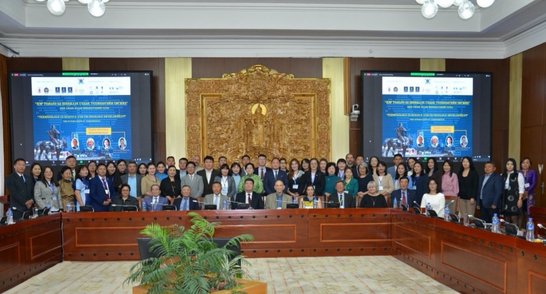Terminology planning strategy and terminology infrastructure for Mongolia to support scientific and educational development and innovation

Cooperating countries: Mongolia and Austria
Coordinating institution: University of Vienna
Partner institutions: Mongolian Academy of Sciences, Austrian Academy of Sciences
Project duration: 1 November 2020 - 31 October 2024
Budget: € 49.500,00
Project summary
Behind Kazakhstan, Mongolia is the world's second-largest landlocked country most sparsely populated with a population of around 3m people. It is sandwiched between Russia to the north and the People’s Republic of China (POC) to the south, where it neighbours the Inner Mongolia Autonomous Region. Despite many unfavourable conditions, Mongolia tries hard to develop in terms of education and industry – and sees the development of terminologies as a key for this development as well as for the preservation of its language and culture.
According to the international standard ISO 29383:2010 “Terminology planning comprises activities aimed at developing, improving, implementing and disseminating the terminology of a subject field”. Thus, scientific-technical terminologies are fundamental and crucial for specialized language development, higher education, innovation and industry. Terminology planning can strongly support communication planning, science and technology planning, innovation strategies and information and digitalisation policies. Therefore, it falls under the UN’s Strategic Development Goals 9 (Build resilient infrastructure, promote inclusive and sustainable industrialization and foster innovation), 4 (Ensure inclusive and equitable quality education and promote lifelong learning opportunities for all) and 17 (Revitalize the global partnership for sustainable development) as well as under UNESCO policies related to WSIS (World Summit on the Information Society). The UN Agenda 2030 and the SDGs call for a social-ecological transformation on a global level. They include a commitment to a global partnership for sustainable development – however, inclusive education, innovation, knowledge transfer, information society, industry and commerce are not possible without well-developed national terminologies and future-oriented terminology infrastructure.
Austria has a time-honored profound experience and in fact pioneering history in most aspects related to “terminology science and its manifold applications”, such as terminology science proper, terminology related to language (e.g. applied linguistics and specialized communication, multilingualism, information and documentation, etc.), terminologies in computer applications (e.g. terminology management systems, language technology, knowledge management, content management, automated and computer-assisted translation, eLearning, etc.), terminology at strategic level (e.g. terminology policies, educational strategies, national terminology infrastructure, etc.), terminology teaching and training (TT&T), terminology standardization in all its facets.
Mongolian institutions are striving to develop terminological approaches, methods, policies and technology most appropriate for strategic as well as practical purposes. In cooperation with the University of Vienna and Austrian Academy of Sciences these efforts will be further analysed and explored, providing expertise in developing relevant infrastructure and strategies, pertinent open systems and the knowhow to adapt them, an array of content resources, domain literature and TT&T activities. The main objective of the project is to assist Mongolian institutions and experts in designing and developing a comprehensive framework for a terminology planning policy with supporting strategies for knowledge transfer,
encompassing a sustainable infrastructure and expertise to implement a terminology infrastructure comprising a (physical or virtual) terminology documentation centre and a national terminology database.
